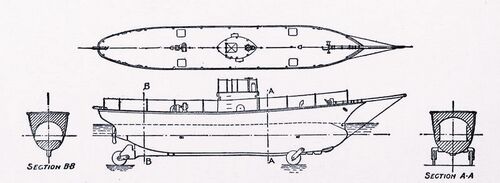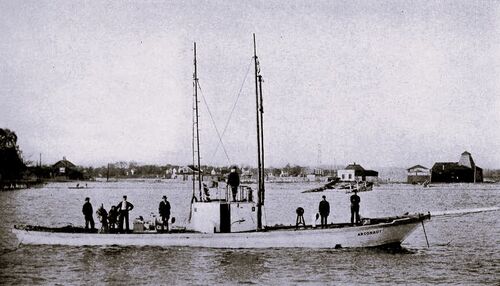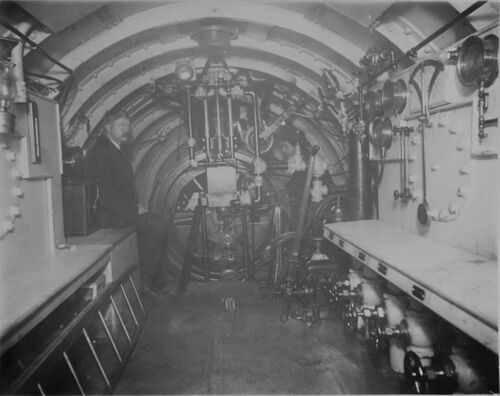Argonaut II

Drawing from the book The Submarine in War and Peace by Simon Lake, courtesy of Project Gutenberg.

The Argonaut II afloat in a calm harbor, location unknown but likely near Bridgeport, CT, the vessel's homeport. The conning tower now has a substantial fairwater around it. When surfaced the boat greatly resembled any other surface craft.
Lake used the boat for salvage work in the 1900-1901 period, working many sites on the U.S. east coast. He developed a submersible unmanned cargo carrier to work alongside the Argonaut II, and successfully salvaged numerous wrecks for coal, copper ore, and copper matte, which he sold back to the original owners for a substantial profit. As a means of promoting himself and his technical concepts, Lake also used the boat to take influential friends on undersea tours, with one voyage cramming 24 people into the boat, in addition to the crew. Lake quickly became quite wealthy, and by the fall of 1900 was considered one of Bridgeport's leading citizens. The fortune that he made was used to incorporate the Lake Torpedo Boat Company in 1901, the organization that would design or build all of his subsequent submarines for the U.S. Navy.
Photo from the book The Submarine in War and Peace by Simon Lake, courtesy of Project Gutenberg.

The interior of the Argonaut II looking aft from the center of the boat. Engine designer Arthur Middleton is seen on the left next to the flywheel for the upgraded 60 hp White & Middleton gasoline engine. Barely seen on the right is the head of another engineer. On the left and right are likely ballast tanks. Each one has a bolted down manhole cover used to allow access to the tanks for maintenance while in a yard period. The long arm of an angle indicator can be seen on the right, with depth gauges on either side. There is a tank level sight glass right next to the manhole cover on the right.
Photo NH 57032 courtesy of NHHC.
Page created by:
Ric Hedman & David Johnston
1999 - 2023 - PigBoats.COM©
Mountlake Terrace, WA, Norfolk, VA
webmaster@pigboats.com
